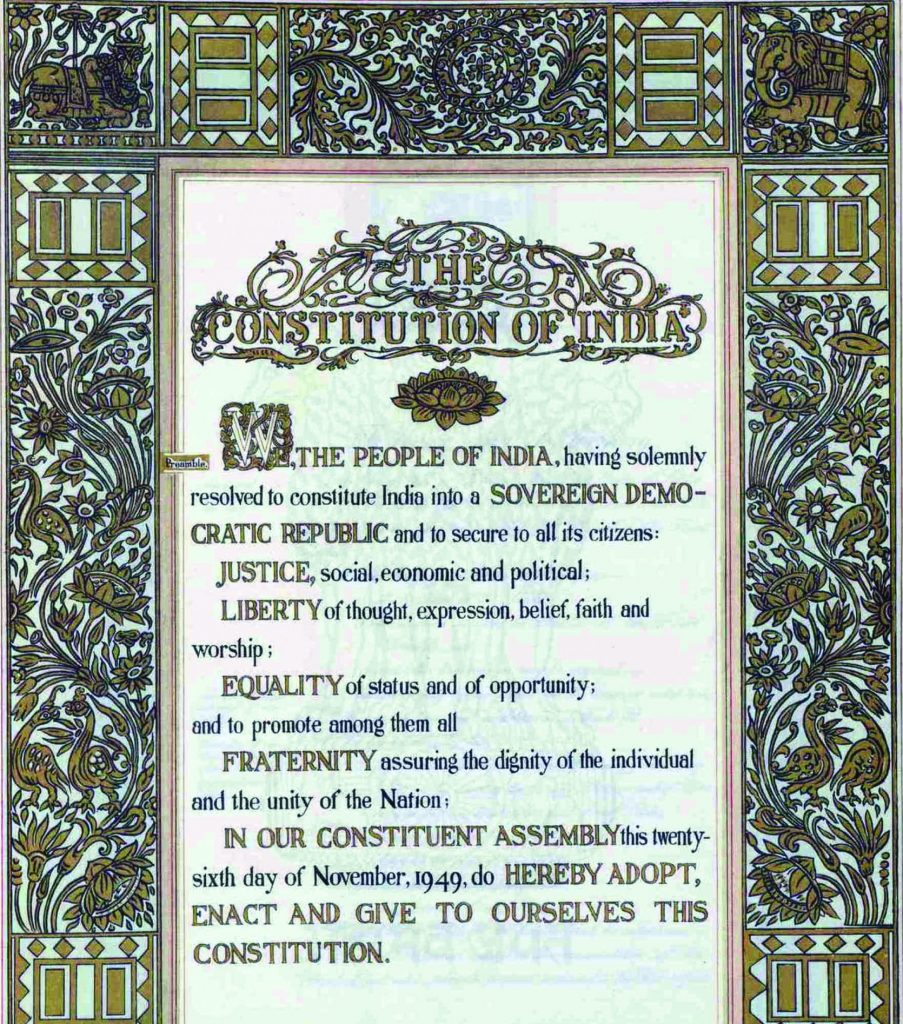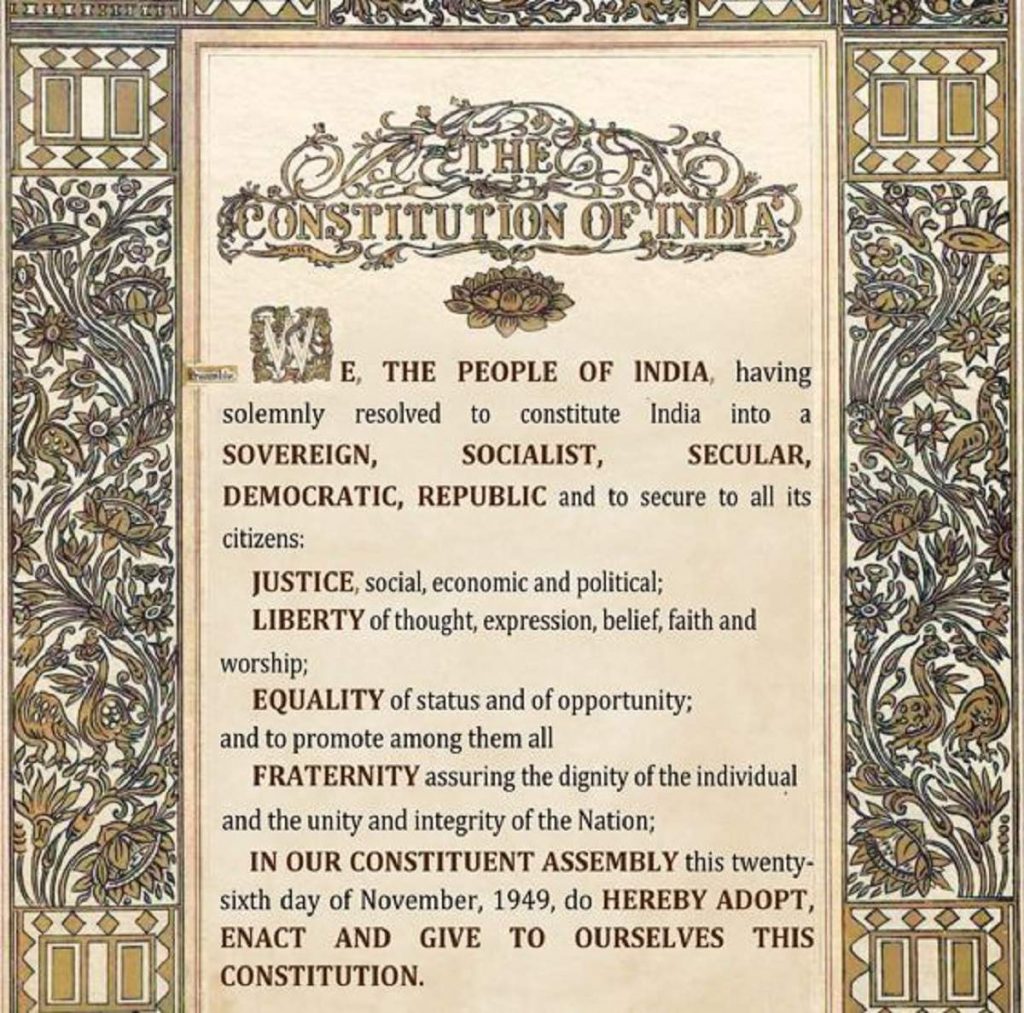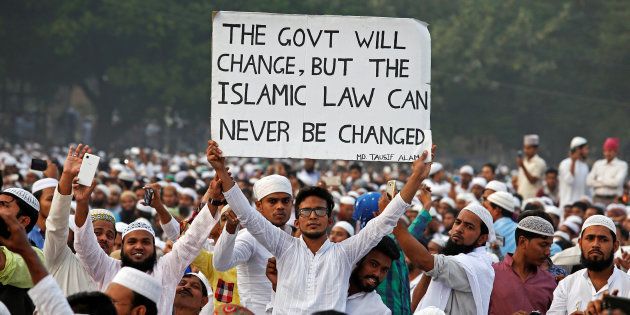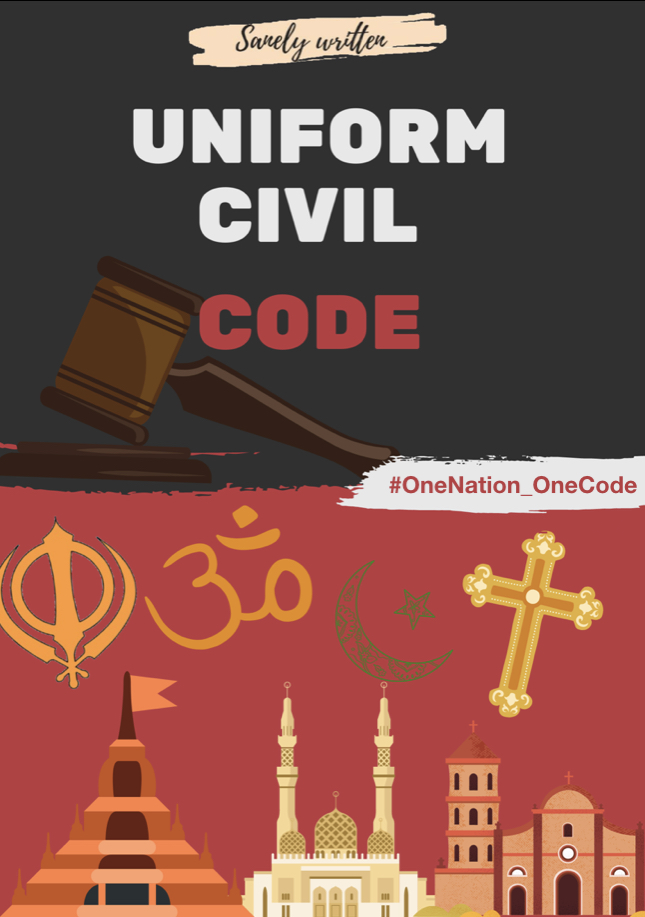
Original Preamble 
Preamble after 42nd amendment
August 4, 1991 – The law-court of Hyderabad was brought a case where a 10-year-old girl was being sold for ₹6000 as a concubine to a toothless Arab national in the late sixties. The plan of Yahiya H.M. Al Sagish was to take his slave back to his country. When asked about his relationship with the girl, Al Sagish boldly admitted that he was taking the girl to Arab as his wife. Now for all those readers who have been knowing a thing or two about the law of India would say at this point that this case was a straightforward one where Al Sagish would have been booked for child marriage. Well, if you were in the same line, surprise-surprise, the verdict of the case was nothing that you have thought. The law-court was left powerless when Al Sagish invoked the muslim Shariat law which says that a girl above 9 years of age has attained puberty (maybe the framers of Shariat laws had bad biologists but this debate is for another time) and is ripe for marriage. Thus, Al Sagish was allowed to fly to his country with a 10-year-old girl.
In this piece we are going down the alleys of personal laws and their practices in India to bring to you, the bigotry of the contemporary secularism of this country, the secularism of which the fathers of Indian constitution knew a little, the secularism that refuses to get sad when Kashmiri Pandit’s blood gets spilled because it is the propaganda of so-called ‘communal hatemongers’, the secularism that weeps in water and blood when an advertisement is barred but remains silent when Al Sagish does a child marriage, the secularism that allows Abdul to have multiple wives but penalises Aman for polygamy, the secularism that allows the government to snatch the wealth of the temples but prohibits it from doing the same with mosques or the churches.
It is for us to understand that Secularism never made into the original preamble to the constitution of India because none of the framers found it necessary to give a name to the very fabric of this country. It is for us to know that this Secularism was inked in the preamble during the 42nd amendment when all the opposition leaders were lying in jail during the dark months of Emergency. This piece is for all those who, until now, could have gone to any length to claim that India is a Secular country. We humbly say that till the date Uniform Civil Code is implemented, India is not a Secular country.
In its most simple definition, the Uniform Civil Code is an idea of ‘One Nation One Code’. The scheme is to bring together the retrograde personal laws of all the religions and to formulate a single set of laws that governs the issues of adoption, marriage, divorce and inheritance in all religions. The problem with personal law is that however sacred they might be in their context, there is no denying the fact that such laws have been failing to fit in the progressive society for a long time. Also, the evils that they bring with them fortifies the need to bring a system where a fraction of people in this equality-seeking state might not get privileged or stigmatised solely because of the religion they practice. Personal laws are an inordinate impediment to the equality guaranteed by the constitution of India.
The inclusion of the Uniform Civil Code in the Indian constitution has been contemplated since the time of independence. Indian Parliament had a parley on it in 1948. It met with off-putting reactions from Porcker Saheb, a muslim fundamentalist and individuals from different religions (Hindu fundamentalists favouring Sati). Dr B.R. Ambedkar, G.S. Iyengar, K.M. Munshiji and Alladi Krishnaswamy Iyer supported UCC. Despite the fact that the Congress had consoled the post-partition muslims to rehearse Islamic laws, the muslims were hostile towards UCC and thought that it would demean their status in India while the muslims in Pakistan would continue to adhere to Shariat. As a stalemate, the framers of the Constitution put the Uniform Civil Code in the Directive Principles of State Policy in Article 44, making it non-compulsory and left upon the discretion of the states. Many important individuals expressed their dissent by drawing other’s attention to the fact that the values of the nation were being hampered by the very presence of religion-based individual laws. Previously, it was favoured to ensure the Uniform Civil Code to the Indians within a decade. Seven decades have passed and we are still meditating over such a probability.
So why is this taking so long? Since independence, India had seen growth in the pool of people, communities and political parties that have bolstered their position in Indian rule. A section of intellectualists in India who proclaims themselves to be the champions of pluralism and secularism, but when asked about the contempt of such secularism made by the personal laws, they avoid answering. Because the real scheme is to perpetrate minorityism in the disguise of secularism.
So, does anyone who talks about secularism inevitably ends up with talking about the favours enjoyed by a minority? It is after much research, we can safely say that every definition of secularism that goes around the nation is wrong. Firstly, we need to educate ourselves about the secularism that is actually guaranteed by our constitution, not which the columns of the liberals convey, but the real one. The term “Secularism” was born in Europe as an idea to prevent the Church from meddling in the issues of the State. Secularism, in layman’s term, insinuates religion (whichever it might be) has no say in the political and law structure and being a personal pledge. Similarly, the State can never interfere, control or acquire a religion. A citizen is not liable to acknowledge all religions and has complete freedom to acknowledge no religion (atheists), however, he/she cannot loathe against any person on the grounds of the religion practised by him/her. There is no other nation on the face of the earth other than India, professing to be a secular state yet pursuing different laws for different networks of religion. Certain Muslim communities in the UK, France and Australia have requested the usage of the sharia in their nations yet their requests were not acknowledged, for the laws already present there are equal for all individuals. Everything being equal, yet everybody is allowed to practice and propagate their confidence. Our very own constitution-composers who made India a secular state (but never felt to mention it) by embedding Articles 25 to Article 30 in the Constitution that safeguards the privilege to rehearse and spread one’s religion and the privileges of the religious minorities to set up instructive foundations likewise embedded Article 44 of our Constitution that guides the State to present a uniform common code, thinking of it as a necessity of achieving a truly secular state.

The Supreme Court of India has always stood in support of a Uniform Civil Code in the country, be it the famous Shah Bano Case or Sarala Mudgal Case. In a case of S.R. Bommai Vs Union of India, as per Justice Jeevan Reddy, it was held that “religion is the matter of individual faith and cannot be mixed with secular activities, secular activities can be regulated by the State by enacting a law”.
UCC is not against secularism or will not abuse Article 25 (all persons are equally entitled to freedom of conscience and the right to freely profess, practise, and propagate religion subject to public order, morality and health) and Article 26 (all denominations can manage their own affairs in matters of religion). Article 44 is based on the idea that there is no vital association among religion and individual law in a progressive society. The UCC will not obstruct one’s religious convictions relating to marriage, divorce and inheritance. This implies under the UCC a Hindu will not be constrained to play out a nikah or a Muslim be compelled to do Sati. Be that as it may, in issues of legacy, appropriate to property, upkeep and progression, there will be a precedent-based law.
Majority of personal laws are absurd, thankfully Triple Talaq has been shunned by the government but other personal laws will not cease to exist unless UCC is introduced. We have given one such law at the beginning of this piece. The divorce of a Christian couple is another such black law. According to it, a Christian woman can seek a divorce from her husband under this law on limited grounds such as if her husband has accepted other religion or had committed polygamy, adultery or both. Even after finding such basis, the verdict of divorce can only be pronounced by a full bench (three or more than three judges) of the high court. Therefore, it becomes impossible to get a divorce from her husband for other differences. Many Hindu personal laws carry the same evil. One such law is of Hindu Succession which coarsely winds up as being patriarchal as in most clauses of this law, the property is relayed to male heirs. Despite the fact that UCC will put an end to such Hindu laws too, the BJP/RSS and the entire Hindu right has demanded and advocated for it.
The problem with the pseudo-secular mob is that their political and ideological ground is reinforced by the minorities, and thus however golden their claims about utopian equality might seem, they do not want Uniform Civil Code to destroy the privileges enjoyed by the minorities in personal laws. With BJP, whose manifesto has always included this subject, in power for over six years, it is high times when Uniform Civil Code shall be realised so that no girl of 10 years of age be sold to an old trafficker because a particular personal law says so.
Reference/s:
1. Uniform Civil Code : A suggestion, Indian Law Institute
2. Why do we need a Uniform Civil Code
3. Necessity of Uniform Civil Code in India, Journal of Constitutional Law and Jurisprudence




4 replies on “Uniform Civil Code”
Very nice
Beautifully written
Well written about the secularism and the uniform civil code.That’s what I like , an unbiased article…
[…] country is affected by this atmosphere of hate. Well, we have cleared our take on pluralism in our previous pieces, this one is about a different issue. It is about the paradox of […]